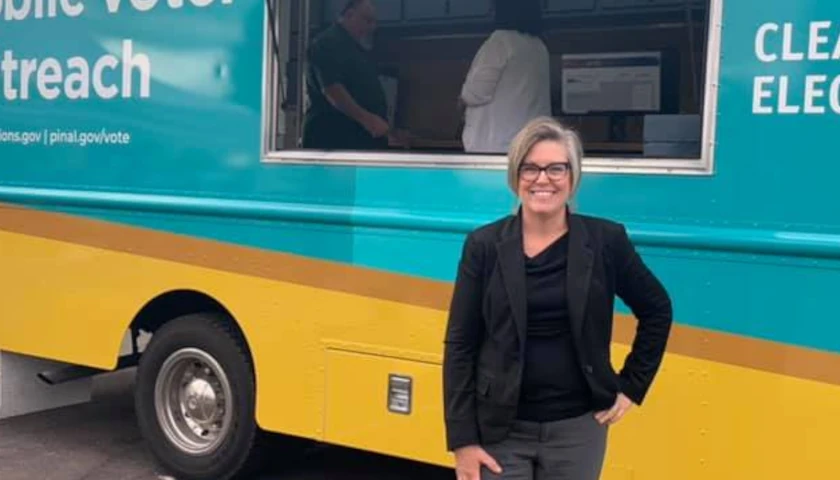The Arizona Republican Party (AZGOP) filed a lawsuit last month against Democratic Governor Katie Hobbs over her “unconstitutional” executive orders relaxing election laws. The Petition for Special Action challenged Hobbs placing voter registration forms at prisons and designating the prisons as ballot drop-off locations, which the AZGOP stated was taking “ultra vires” actions, meaning beyond her legal power and authority.
The lawsuit, filed by former Arizona Court of Appeals Justice Andrew Gould and others and representing AZGOP Chair Gina Swoboda, alleged that Executive Orders 2023-23 and 2023-25 “exceed the powers granted her by the Arizona Constitution and Arizona statutes, violate the separation of powers regarding the Legislature’s authority to enact election laws; and usurp the powers lawfully granted to the Secretary of State regarding the designation of Voter Registration Agencies and county recorders regarding ballot drop-off locations.” The petition said Hobbs does not have the authority to issue them within her executive power.
Hobbs designated the Arizona Department of Corrections, Rehabilitation, and Reentry and the Arizona Department of Juvenile Corrections for these locations, as well as other state agencies. However, “EO 23 is silent about important issues regarding completed ballots and voting procedures including, for example, where to store completed ballots until they can be sent to the appropriate election officials or keeping a chain-of-custody log for these completed ballots.”
EO 25 orders prisons and other state agencies to “make voter registration forms available in conspicuous public locations.”
The petition noted that Hobbs placed no expiration date on the orders, and did not issue them under the guise of an emergency, like former Governor Doug Ducey did with COVID-19 executive orders.
Additionally, the petition said that EO 25 required state agencies to provide a report to her by June 30 detailing whether there were opportunities to provide voter registration assistance. The petition said it appears this was not complied with by state agencies.
The petition went over numerous Arizona statutes which place voter registration duties with county recorders, not the executive branch, stating, “Arizona law establishes that only the board of supervisors for each county can establish voting locations and drop-off locations for completed ballots.”
Arizona law also states in A.R.S. 16-140(A) that “public assistance agencies and disabilities agencies … shall provide the opportunity to register to vote for those persons who apply for benefits or appear at the agency to renew, recertify[,] or change address information.” It says nothing about prisons providing voter registration.
The complaint concluded, “The Arizona law is clear on who can distribute and accept voter registration forms and completed ballots: (1) public assistance or disabilities agencies as defined by statute; or (2) a location/agency as designated by a county recorder (or designee of a county recorder) or justice of the peace. The Governor is nowhere included in this clear line of authority. The same is true for determining voting locations.” The AZGOP asked the court to declare the two executive orders unconstitutional, and requested attorneys’ fees and costs.
Courts around the country are increasingly striking down unconstitutional and overreaching actions by governors and other local and state officials enacted right before elections. In Ritchie v. Polis, the Colorado Supreme Court threw out an executive order creating an exception to the requirement that signatures on petitions used to place initiatives on the ballot be collected in person. The court said it violated the law, reasoning, “that requirement cannot be suspended by executive order, the Governor is not authorized to create an exception to that requirement.”
In RNC/Trump v. Miller, an Iowa district court judge issued an injunction stopping the secretary of state from sending unrequested absentee ballot request forms to every voter with pre-populated fields. In Donald J. Trump for President v. Simon, the Minnesota Supreme Court ruled that the secretary of state extended the deadline for receipt of ballots without legislative authorization.
In Donald J. Trump for President, Inc. v. Kathy Boockvar, et al., the Commonwealth Court of Pennsylvania held that the secretary of state lacked statutory authority to change the deadline to provide proof of ID, so those ballots could not be counted. In Jefferson v. Dane County, the Wisconsin Supreme Court stopped a clerk from stating on Facebook that voters could designate themselves as “indefinitely confined” solely due to the Wisconsin Safer at Home order, thereby avoiding proof of ID when requesting an absentee ballot.
In RNC v. Newsom, after the Republican National Committee filed a lawsuit, California Governor Gavin Newsom stopped mailing ballots to every registered voter in the state. In RNC v. Weipert and RNC v. Gill, an Iowa district court judge stopped Iowa county auditors from sending voters absentee ballot applications prepopulated with some of their voter information. In Carson v. Simon, the Eighth Circuit Court of Appeals Told the state to segregate the late ballots, suggesting they would not be counted, after the secretary of state extended the deadline for receipt of ballots without legislative authorization.
In Reed v. Virginia Dept. of Elections, the Frederick Circuit Court Issued a consent decree prohibiting the state from accepting absentee ballots received up to three days after Election Day without postmarks in violation of Virginia law.
Democrats tend to favor giving felons the right to vote after they leave prison. A survey published in The Annals of the American Academy of Political and Social Science found that those who register to vote after leaving prison overwhelmingly vote Democrat. In New York, almost 62 percent of convicts who register to vote are Democrats while only 9 percent are Republicans. In a state that has more balanced numbers of Republicans and Democrats in the population the difference is still stark: 54 percent of convicts registered to vote are Democrats while only 10.2 percent are Republican.
– – –
Rachel Alexander is a reporter at The Arizona Sun Times and The Star News Network. Follow Rachel on X/Twitter. Email tips to [email protected].
Photo “Katie Hobbs” by Katie Hobbs.





